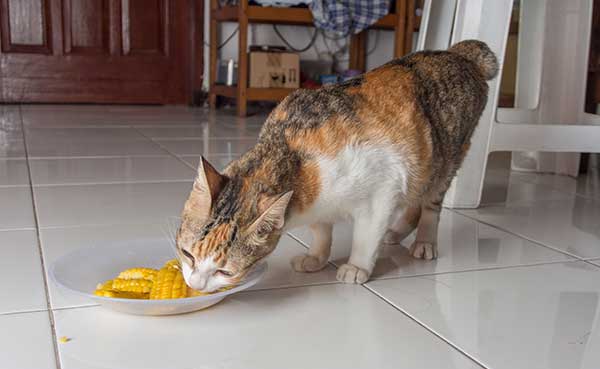Corn is a popular food crop grown all over the world. In many countries, the production of corn surpasses that of wheat and rice combined.
In developed countries, corn is mostly used as feed for farm animals, particularly cows and horses. However, in developing countries, the plant is cultivated almost exclusively for human consumption.
Whichever the case, you must have snacked on cornmeal at some point in your life. And if you’re like most people, hardly a week goes by without eating cornmeal or other corn-based foods.
Corn is a popular ingredient in most commercial dry foods. Cornmeal is especially popular for its delectable taste and high nutritional profile.
However, can our cats benefit from the same health and dietary properties of corn? Is corn poisonous to cats or should I freely offer it to my feline friend?
Technically, cats can eat corn. There are no immediate health concerns to worry about. However, being a plant-based food, you should serve corn to your cat only as an occasional treat.
In this post, we shall explore everything there is to know about corn for cats. We will review the possible health benefits of corn for your feline friend, as well as highlight some associated risks and see how best to serve the food to your kitto.
Table of Contents
Is It Safe For Cats To Eat Corn? A Look at the Possible Health Benefits of Corn
Is it ok for cats to eat corn?
According to research, 100 grams of boiled corn boasts the following nutritional elements;
- Calories – 96
- Carbs – 21 g
- Fat – 1.5 g
- Fiber – 2.4 g
- Monounsaturated – 0.37 g
- Omega-3 – 0.02 g
- Omega-6 – 0.59 g
- Polyunsaturated – 0.6 g
- Protein – 3.4 g
- Saturated – 0.2 g
- Sugar – 4.5 g
- Water – 73 %
Evidently, corn enjoys a rich dietary profile, and that may have you wondering, can my cat eat corn and why do cats like corn?
Again, the answer is a yes, cats can eat corn. As for why they love corn, it might have to do with sheer feline curiosity.
The following are some of the ways your cat can benefit from corn;
1. Helps with Digestion
Corn comes with a fair amount of fiber, most notably insoluble fibers like cellulose, lignin, and hemicellulose.
The fiber content in corn is not as high as it is in other plant-based foods, but just enough to benefit your kitto. Fiber serves various fundamental functions in the body of your cat.
First, it supplies the nutrients required by your cat’s gut-friendly bacteria. Gut-friendly bacteria are located in your cat’s digestive tract, and play a crucial role in ensuring efficient food digestion.
Fiber, more particularly the insoluble fiber, also play a key role in bulking of stool, thereby regulating your cat’s bowel movements.
Lastly, fiber creates a sense of fullness. So, adding a small amount of corn to your cat’s regular diet will cause the cat to eat less but feel fuller for longer. That’s useful in managing the portions of food that your cat eats, as a measure of guarding against obesity and other weight-related diseases.
- Number 1 veterinarian-recommended cat probiotic brand to support digestive health (Kantar Veterinary Tracker, 2021), making it an...
- Purina Pro Plan Sensitive stomach cat food supplement for the dietary management of kittens and adult cats with cat diarrhea
- Digestive Care Cat Food supplement containing probiotics proven to promote intestinal health and balance
Last update on 2025-03-29 / Affiliate links / Images from Amazon Product Advertising API
2. Rich Source of Protein
Corn also comes with a fair share of protein. It contains numerous varieties of protein, with zeins being the most abundant. Protein forms the building blocks of your cat’s cells, tissues, and muscles.
However, experts have always raised an issue with regards to the quality of protein found in corn, seeing as it lacks in essential amino acids.
Remember that cats benefit a lot from proteins that are loaded with essential amino acids, such as animal protein.
3. A Low-fat Food
Whole corn is considered one of the low-fat foods, with fat content ranging between 5 and 6%. Therefore, it can serve as an alternative for most high-fat foods.
However, note that refined corn oil contains a relatively high-fat content compared to whole corn.
4. Boosts Immunity
Corn is rich in antioxidants, including carotenoids like lutein and zeaxanthin. These antioxidants can boost your cat’s immunity by reducing the oxidative damage to the cat’s body cells.
Carotenoids have especially been cited for their ability to promote eye health. Also, they could help to keep certain chronic diseases at bay, including heart disease, cancer, diabetes, feline arthritis, etc.
Recent studies have also shown that corn might help to protect against diverticulosis. Diverticulosis, also known as diverticular disease, refers to a condition that causes pouches in intestinal walls. It’s symptomized by cramps, bloating, and flatulence.
Besides the above benefits, corn is also abundant in numerous other vitamins and minerals, and each of them plays a significant role in your cat’s system.
The following are some of these minerals;
- Manganese
- Phosphorus
- Zinc
- Copper
- Magnesium
- Niacin
- Potassium
- Vitamin B5/Pantothenic acid
- Vitamin B6
- Vitamin B9/Folate
As you can see, corn comes loaded with immense health and nutritional benefits for your cat. So, should you go ahead and offer corn to your kitto?
Yes, but with some caveats. The following sections shall expound further on that.
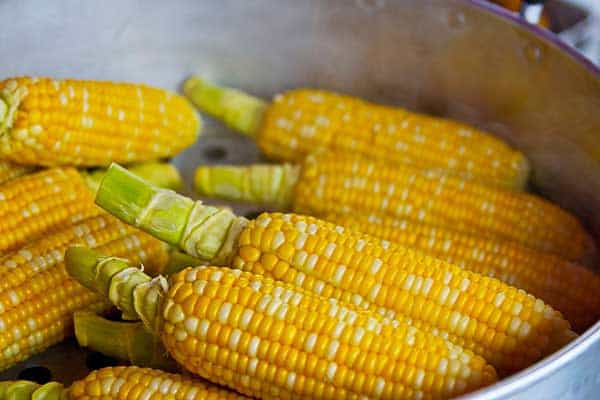
Is Corn Toxic To Cats? Here’s What Could Go Wrong
We’ve already highlighted the potential benefits of corn for cats. We’ve also mentioned that those benefits notwithstanding, you should only offer corn to your cat in moderation. That’s because there are a few side effects that could result from your cat eating corn.
So, why is corn bad for cats? The following are some of the demerits of corn for cats.
1. Deficiency in Amino Acids
Corn is high in protein, alright. Unfortunately, the protein in corn lacks a crucial component – essential amino acids.
It’s important to remember that cats are obligate carnivores. As such, they thrive on a diet of animal protein, which is usually high in amino acids. So, offering your cat food that’s low in essential amino acids is more like an act in futility.
2. High in Carbs and Sugars
Carbohydrates are not dangerous to cats per se. However, cats don’t require them as much as they need animal protein. Plus, cats don’t digest carbs so well.
But perhaps the more dangerous component of the carbohydrates found in corn is sugars, which mostly exists in the form of sucrose.
Besides being unable to digest carbs well, spikes in your cat’s blood sugar level could lead to a wide spectrum of conditions. Most notably, diseases of the heart and cardiovascular system.
So, maybe you’ve always wondered, can cats digest corn?
The answer depends on the ingredients in question. Generally, cats experience difficulties digesting carbohydrates.
Last update on 2025-03-28 / Affiliate links / Images from Amazon Product Advertising API
3. Allergic Reactions
Are cats allergic to corn?
Yes, for the most part, cats are allergic to corn. As a matter of fact, corn is the only food known to trigger the most cases of allergic reactions in cats. And this mostly ties back to the fact that your cat is an obligate carnivore and as such, eating plant-based food of any kind could cause allergic reactions.
Some of the symptoms of corn allergy include;
- Excessive itching and scratching on the skin;
- Digestive issues like vomiting and diarrhea; and
- Respiratory symptoms, such as wheezing, sneezing, and coughing.
So, does corn cause skin problems in cats?
Yes, as far as corn allergy is concerned, corn could cause your cat some skin problems.
Still on corn allergy, your cat may develop gluten intolerance due to the presence of zeins in corn, which are closely related to gluten. Symptoms of gluten intolerance include bloating, diarrhea, fatigue, and weight loss.
4. Poor Food Digestion
One of the components in corn is phytic acid. Phytic acid is infamous for its ability to inhibit the absorption of dietary minerals like zinc and iron. So, consuming corn may make your cat unable to absorb other minerals.
You may consider soaking, fermenting, or sprouting your corn to reduce the effects of phytic acid. But then again, that could also cause the corn to lose other substantial minerals, making it all the more useless for your cat.
5. Fungi Contamination
Depending on where the corn was cultivated, it might be contaminated by fungi.
Excess fungi on food causes a variety of toxins, known as mycotoxins. These toxins are linked to cancer and other chronic conditions.
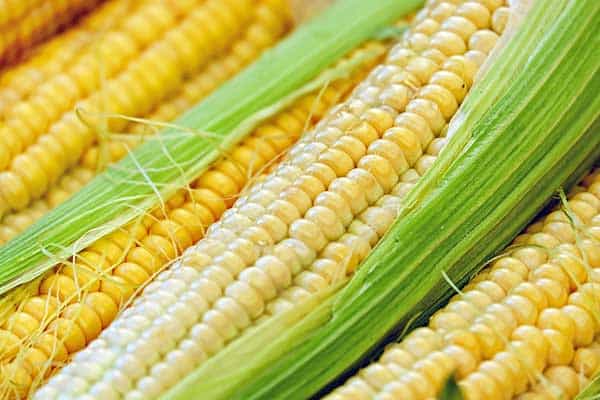
Does The Type Of Corn Matter?
Corn comes in numerous types, and you could be wondering if there are certain variants that are safer for cats than others.
Let’s examine that in detail by answering a couple of related questions on corn and cats.
Can cats eat corn on the cob?
Corn on the cob is as delicious as it’s nutritious. It contains butter, lemon juice, and salt. However, is it OK for cats to eat corn on the cob?
Unfortunately not.
Cats are repulsed by the smell of lemon juice. On the other hand, butter can lead to weight gain and cause gastrointestinal irritation to your cat, while salt could lead to sodium ion poisoning.
Sodium ion poisoning is a fatal condition that starts with frequent thirst sensation before leading to kidney damage.
Can cats eat corn chips?
Corn chips are loaded with sugar, garlic, onions, and other seasonings. All of these ingredients make corn chips potentially toxic for cats.
Onion and garlic might lead to severe health problems for your cat. The two cause various digestive complications, rupture of red blood cells, and multiple organ failure.
And this also begs the question, can cats eat tortilla chips? What of Doritos, can cats eat Doritos?
Corn chips of any kind, be it tortilla chips, Doritos, or other variety, aren’t safe for cats.
- EASY TO USE, IMPACTFUL RESULTS: Collect a sample, package it up, and send it securely back. Just register, swab, return with the...
- MOST COMPREHENSIVE BREED & TRAIT: Our test distinguishes over 20+ distinct breeds and 50+ trait markers with the most...
- SCREEN FOR 40+ GENETIC DISEASES: Get peace of mind by screening for 64 health markers associated with 43 diseases for which your...
Last update on 2025-03-29 / Affiliate links / Images from Amazon Product Advertising API
Can cats eat cornbread?
Cornbread mostly contains breading and processed sausage meat. The breading is useless for your kitto while the processed sausage meat might be dangerous for the cat. And that applies to any type of cornbread, including tacos.
Can cats eat popcorn?
Plain popcorn isn’t immediately dangerous to cats. However, avoid popcorn that’s prepared with butter, salt, seasoning, or other additives that are considered harmful for felines.
Fried kernels are especially discouraged as they’re usually high in fat and sodium. Similarly, you should avoid offering your cat unpopped kernels since these might damage the cat’s teeth as well as cause choking.
Can cats eat sweet corn?
Sweet corn is perfectly safe for cats if you serve it boiled, grilled, and with no condiments or seasoning. And that brings us to the different methods of corn preparation, and you could be wondering, can cats eat fresh corn?
Much as it packs a high nutritional value, fresh corn isn’t recommended for cats. That’s because it could present a choking hazard. Fresh corn also contains harmful fungal toxins.
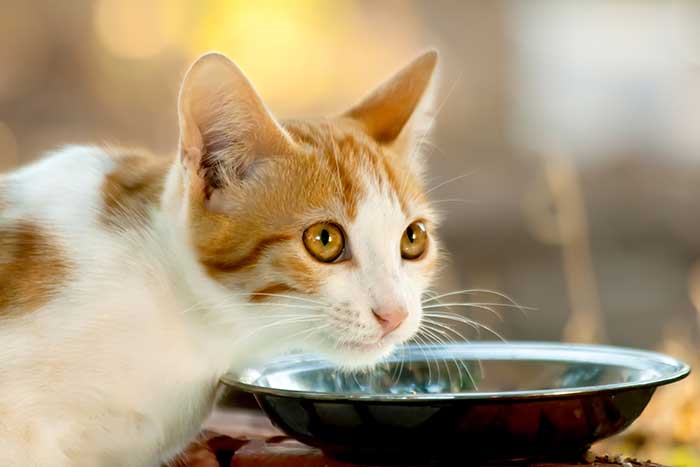
So, can cats eat cooked corn then?
Yes, cats can eat cooked corn, provided you serve your cat boiled or grilled corn. And that helps answer another popular question related to cats and corn – can cats eat boiled corn?
But while cats can eat boiled or grilled corn, remember the meal shouldn’t contain any condiments.
Can cats eat candy corn?
The word candy alone makes candy corn an unhealthy treat for cats. Cats shouldn’t eat foods that are high in sugar, so avoid feeding your kitto candy corn.
Can cats eat corn husks?
No, corn husks may cause diarrhea, vomiting, loss of appetite, and excessive drooling for cats. Your cat could also suffer from intestinal blockage from eating corn husks.
Now, it’s difficult to discuss corn husks without making reference to corn flakes, corn starch, and baby corn. But can cats eat corn flakes? And can cats eat baby corn? What of corn starch, can cats eat corn starch?
The answer to each question is a no. Baby corn, corn flakes, and corn starch might cause gastrointestinal issues for your cat.
Can Cats Eat Corn Products?
There has always been the question of corn in cat food. And some cat owners may be wondering, why does corn appear on cat food ingredient lists and is corn in the cat foods good or bad?
Generally, corn gluten meal in cat food isn’t entirely bad; neither are most types of corn in cat products. Corn is usually added to supplement the nutritional value of your regular cat food.
However, does that make corn safe in cat foods?
Well, that depends on the product we’re talking about. For instance, corn chips and cornbread are considered harmful for cats. But what about cornmeal, can cats eat cornmeal?
When it comes to cornmeal, your concern should be both the ingredients used and the method of preservation.
Speaking of preservation, cornmeal can either be preserved by canning or freezing. But, can cats eat canned corn? And what of frozen corn, can cats eat frozen corn?
Canned corn is recommended for cats as the cat gets to drink a lot of water while snacking on the canned corn, which might help with dehydration. Frozen corn isn’t entirely bad as long as you don’t offer the corn to your cat when it’s still cold.
Now, corn products may also come in the form of creamed or caramel corn. And that begs the questions, can cats eat creamed corn, and can cats eat caramel corn?
Creamed and caramel corn are both harmful to cats, considering that each contains additives that are considered toxic for cats.
Can kittens eat corn?
Generally, kittens should not eat corn, ostensibly due to their sensitive stomachs.
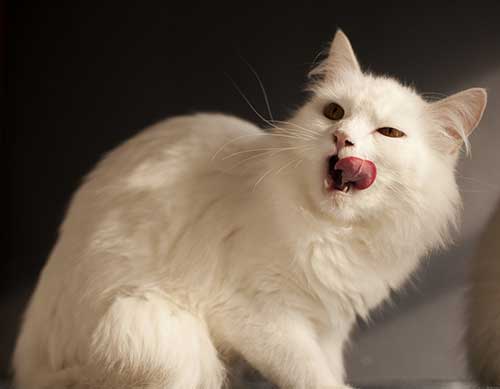
How Much Corn Can Cats Eat?
So, should you let your cat eat corn?
Yes, but in moderation. While corn isn’t entirely toxic for cats, you should monitor the portions of corn that you offer to your feline friend.
Your best bet is to invest in safe and nutritious corn-based cat food, such as ORIGEN Cat & Kitten Food, Royal Canine Dry Cat Food, and ACANA Regionals Dry Cat Food.

